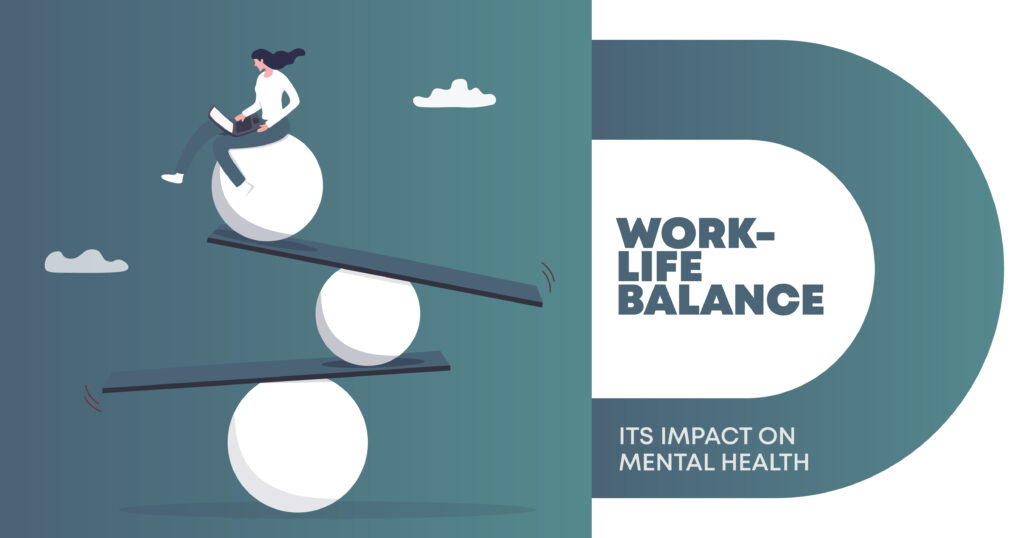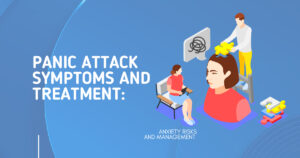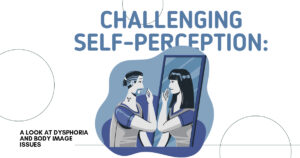Today, creating a healthy balance between work and life may come across as a juggling act that is never-ending. Tied down to remote work and expected to be constantly available, the lines separating professional obligations from personal needs so easily blur. But never has the need to balance work and the rest of one’s life been more critical. The balance is not just a matter of a smooth operation at work or in the house but a question of maintaining your mental health.
In this blog, we are going in-depth into what work-life balance really is, how an imbalance in such aspects can affect your mental health, and most importantly, how you can take control and achieve a healthier balance that works for you.
What Is Work-Life Balance?
Work-life balance is a term kicked around a lot in the recent past, but what does it really mean? Fundamentally, it is the potential coordination of job responsibilities with time and energy for personal life. This is not about working less; it is about managing time and energy effectively so that work and personal life are not made to suffer.
For some, it might mean fewer hours, while for others, it’s a clear separation between the time that one devotes to working and the time left for other personal activities. The bottom line is that balance really looks different to each person. What matters most is finding your unique rhythm.
Mental Health Center of San Diego
Why Achieving Work-Life Balance Is Harder Now Than Ever
So why is it so hard to find balance these days? With technology that enables us to always be connected to each other, it is pretty easy to feel like we should be available to work any time. While remote work indeed offers flexibility, it also makes the boundary between work and home more of a blur. You’re just a few footsteps away from your laptop instead of a commute, and it’s all too tempting to send “just one more email” late at night.
Add to that the pressure from societal expectations, be those trying to meet deadlines, trying to be perfect parents, or simply trying to hold an active social life, and you will have pretty much explained why so many people can’t find a balance that works for them.
How Work-Life Imbalance Affects Mental Health
Burnout and Its Symptoms
Burnout is one of the common outcomes associated with poor work-life balance. It results when you are emotionally, mentally, and physically spent due to long-continued stress, especially related to work. This is where you may have reached a point in your life where you do not want Monday mornings, or you are emotionally battered, or you have no enthusiasm for things you used to enjoy doing. You could well be experiencing burnout.
Symptoms of burnout include:
- Chronic fatigue or lack of energy
- Irritability or frustration
- Loss of interest or motivation in work
- Difficulty concentrating
- Headaches or gastrointestinal distress
Burnout does not only adversely affect work performance, it is also hazardous to your personal relationships and enjoyment of life.
Stress, Anxiety, and Depression
Long hours, heavy work, and the constant drive to perform are more than just burnout. If one is not watchful, day-to-day work stress builds up and culminates into anxiety and depression. All the time and energy are consumed by work and leave no space for unwinding or personal satisfaction. Every one of these instances combined can make a person more prone to mental disorders.
Anxiety from chronic stress will be exhibited as persistent worry, restlessness, or even physical symptoms like a racing heartbeat. On the other hand, when a person feels trapped in a situation, it means they do not see a way out, and work pressures or lack of room for personal growth leading to depression may set in.
Impact on Physical Health
It’s not just your mental health that suffers from a poor work-life balance; your physical health takes a hit too. Prolonged stress affects your body in many ways. It can lead to high blood pressure, an increased risk of heart disease, and a weakened immune system. Additionally, constant stress can disrupt your sleep, leaving you feeling exhausted and unable to recharge.
When your body is constantly in “fight or flight” mode due to stress, it can take a serious toll on your overall well-being.
Signs You Need to Improve Your Work-Life Balance
It isn’t always easy to notice when the scale tips and work-life gets out of balance. Sometimes the warning signs are just subtle, and then BAM, you’re overwhelmed. The following are some of the warning signs that you may want to take a closer look at:

Emotional and Mental Warning Signs
- Irritability: If you find yourself getting irritated easily, especially over small things, it could be a sign that stress is taking a toll on your mental health.
- Feeling Overwhelmed: Constantly feeling like you’re drowning in responsibilities and unable to keep up with tasks.
- Lack of Motivation: Losing interest in activities you once enjoyed, whether it’s at work or in your personal life.
Behavioral Signs
- Working Late Nights: Regularly working late into the night or on weekends without taking time for yourself is a red flag.
- Avoiding Social Activities: If you’re too tired to spend time with friends or family, or if you cancel plans because you feel overwhelmed by work, it’s a sign that your balance might be off.
- Inability to “Switch Off”: If you find it difficult to disconnect from work, even during personal time, it’s a strong indicator that your work-life boundaries are blurred.
Physical Warning Signs
- Fatigue: Feeling tired all the time, even after a full night’s sleep, is a sign that stress might be wearing you down.
- Frequent Headaches or Illness: Stress can weaken your immune system, making you more prone to colds, headaches, or other stress-related health issues.
- Digestive Issues: Ongoing stress can affect your digestion, leading to stomach problems or changes in appetite.
The Role of Employers in Promoting Work-Life Balance
How Work Culture Impacts Mental Health
The workplace culture, which extremely influences work-life balance, whether supportive or not, is part of it. If the culture supports long working hours, competitiveness, and being available at any time, then employees may feel obliged to sacrifice their personal life; consequently, this will lead to poor mental health.
Employers prioritizing work-life balance create environments where employees feel supported in taking time for themselves. This can lead to higher productivity, job satisfaction, and reduced stress levels.
Mental Health Center of San Diego
Flexible Working Conditions
An employer can support a better balance by offering flexible working conditions. Possibilities of remote work, flexible hours, and the opportunity to work a four-day week are just some of the means of supporting balance. Flexibility allows employees to manage their schedules and personal lives, contributing to decreased stress and increased satisfaction.
Employee Wellness Programs
Employers can also offer wellness programs that focus on mental health. These programs might include things like access to counseling services, meditation or mindfulness workshops, or even fitness programs. Having mental health days or offering support for employees who need time off for their well-being can also promote work-life balance.

Achieving Work-Life Balance: Practical Tips
Now that we’ve discussed the effects of imbalance let’s talk about how you can take action to restore or maintain a healthy balance between work and personal life.
Set Clear Boundaries Between Work and Personal Life
Establishing firm boundaries between work and home is crucial, especially if you work remotely. Here are a few ways to set these boundaries:
- Designate a specific workspace: If you work from home, create a separate area where work happens and keep it away from your living space.
- Avoid work emails after hours: Set specific hours for when you’re available, and don’t answer work calls or emails outside those times.
- Use technology wisely. Set limits on your phone or computer to reduce the temptation to check work notifications during personal time.
Learn to Say No
Sometimes, these pressures to overwork come from within us. It’s difficult to learn to say “no” but it is a big component to finding a balance. It can be saying no to that extra project at work or saying no to a social invitation because you need to recharge; however, individuals need to learn to put personal well-being first.
Prioritize Self-Care
The point is that self-care isn’t just bubble baths and relaxing; it’s about making active moves to look after your mental, physical, and emotional well-being. This can come through exercise, meditation, journaling, or spending time with people you love. Scheduling regular self-care will ensure that you are always recharging your mental batteries.
Time Management Strategies
Good time management is essential for maintaining a healthy work-life balance. Use strategies like:
- Time blocking: Set aside specific blocks of time for work, personal tasks, and relaxation.
- Pomodoro Technique: This involves working for 25 minutes, then taking a 5-minute break, which helps keep your mind fresh and focused.
- Prioritize tasks: List what needs to be done each day and tackle the most important tasks first.

Communicate Your Needs at Work
Open communication with your employer or manager is key. If you have too much on your plate or find difficulty completing tasks on time, do not hesitate to ask for support. Your mental well-being is just as important as your productivity, and most employers will respect you for being honest about your needs.
Mental Health and Work-Life Balance in the Age of Remote Work
Challenges of Remote Work for Mental Health
While working from home somewhat blurred lines between personal and professional time, flexibility is also a two-edged sword. The flexibility of working from home has translated into feelings of isolation, pressure to be constantly available, and an inability to switch off from work.
Tips for Maintaining Balance While Working from Home
- Create a dedicated workspace: Having a specific place where you work can help you mentally “clock out” when the workday is over.
- Set a strict schedule: Stick to regular working hours and resist the temptation to extend your workday.
- Take regular breaks: Step away from your desk, stretch, and get some fresh air to avoid burnout.
Mental Health Center of San Diego
Prioritizing Your Well-Being
Work-life balance is not a privilege, it’s a need. Maintaining personal well-being prevents burnout, reduces stress, and it can even improve mental and physical health. However bitter the road to achieving that balance may be, it is worth pursuing. Setting limits, practicing self-care, and learning to communicate your needs are some of the many ways you can provide balance to your lifestyle with professional goals and personal happiness combined.
The bottom line is this: You are the boss of your life regarding work/life balance. Take those steps to protect your mental health, and don’t be afraid to make a change when something in your life is not working. A healthy balance between work and personal life can be achieved. It just takes time, effort, and great commitment.









